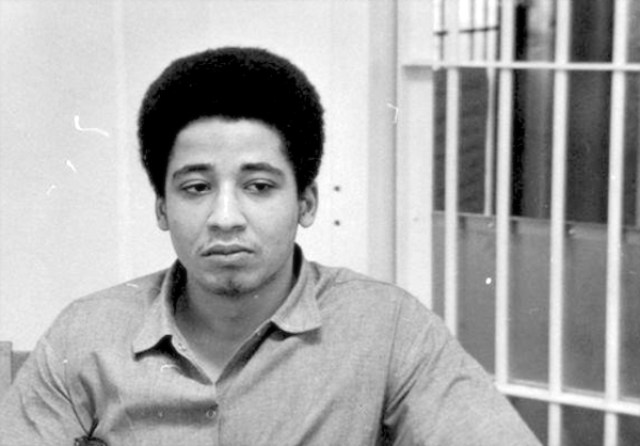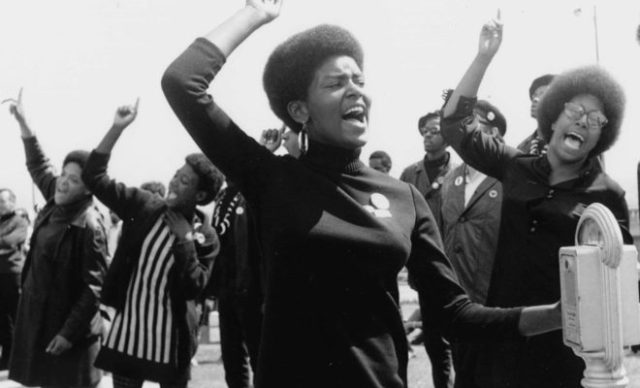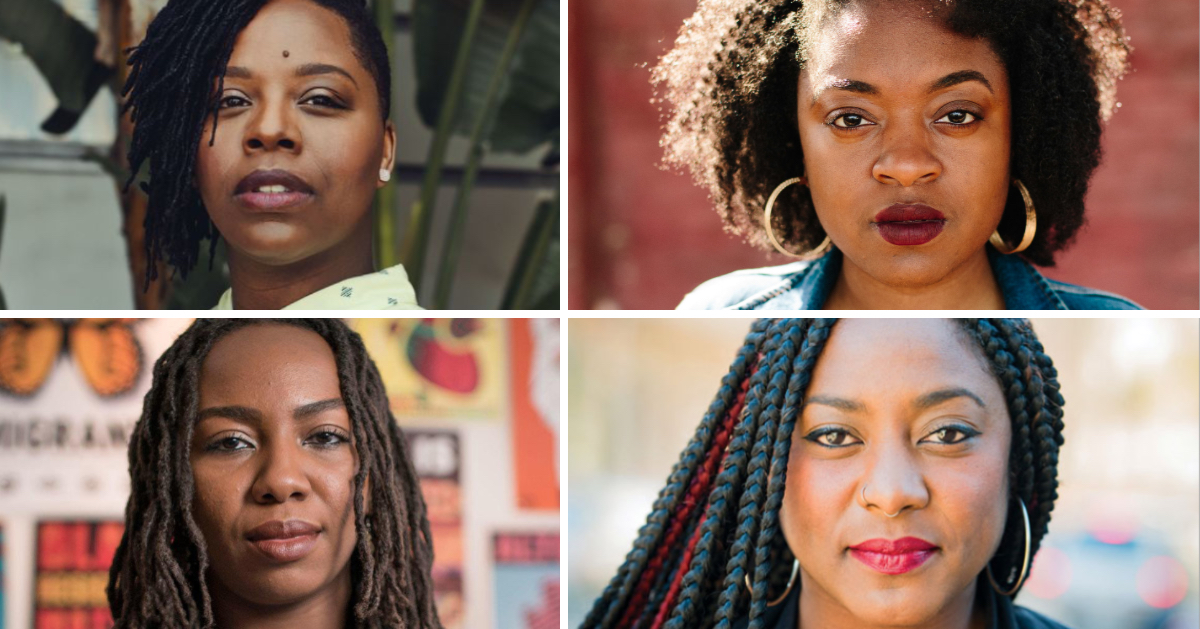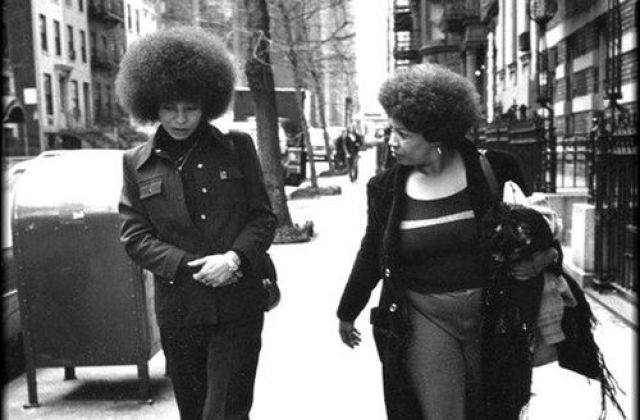There’s a good chance you’ve never heard of Black August before.
The month-long dedication to focus, study, and discipline undertaken by many black activists honors black radical traditions and the ongoing fight against the prison industrial complex and criminal (in)justice systems. It’s also a time of deliberate celebration – an uplifting of black life, black art, and the tenacity of our continued existence against the backdrop of a systematic white supremacy that would much rather snuff out our flame.

Black August began in California’s San Quentin in August 1979 to honor the 1971 August murder of imprisoned black intellectual and Black Panther member George Jackson (many still mark the occasion by re-reading his iconic work, Soledad Brother), as well as the murder of Jonathan Jackson (George’s 17-year-old younger brother), the San Quentin 6, and the birth of the modern prison rights movement. They wanted to pay tribute to the rich history of prison protest in our country and shine a light on the ongoing American failure of freedom that remains out of the grasps of far too many black people. They also sought to commemorate the high number of historically significant events in black freedom struggles that have taken place in the month of August.
You see, August has a fascinating, looming presence in black history. The very first slave ship that came to the American colonies came on shore August 1619. The Haitian Revolution happened in August – along with the Independence Days of Jamaica and Trinidad & Tobago. Nat Turner’s infamous 1831 slave rebellion happened in August (over a century later, so did the 1965 Watts Rebellion). Black Panther Fred Hampton was born in August. Black scholars and political leaders WEB DuBois and Marcus Garvey both died this month. So did Emmett Till. In the world of black queer arts, James Baldwin and Whitney Houston were both born in August. It’s also the month where we lost both Aretha Franklin and Toni Morrison – just a little over a year apart.
The murder of Emmett Till, the March on Washington, and the day that Barack Obama became the first black man to accept the nomination for President of the United States all happened on the same date – August 28th. Hurricane Katrina made landfall in New Orleans one day later on August 29th.
This month is rooted in the sacred tradition of black survival. It’s celebrated in a variety of ways, but most use this time to practice and instill self-discipline. Some fast or abstain from illicit substances; in some black communities there are block parties (in my hometown of Detroit this month they did a bus tour of local Black Panther sites and re-telling of local black radical histories), but most take time to practice serious study. It’s about learning about structures of oppression so that we are better able to fight them, but also about working together to imagine a different kind of world altogether – one that’s broken free from racism and anti-blackness.

The problem? Most of the voices most talked about during Black August are those of cis men. While there’s obvious significant importance to the roles that black men have played in the ongoing quest for black liberation – including the incarcerated black men who founded Black August to begin with – there has been literally no movements of black activism, black politics, or black art that did not have black women, most often black LGBT women, at its backbone!
As we close out the month of August, I wanted to put together an interactive syllabus that brings the labor of some of those women to the forefront. In keeping with the tradition of Black August, this list primarily focuses on women I wanted to highlight who either have direct connections to August, or who have participated in a genealogy of black political movements surrounding criminal injustice/prison abolition. It also doesn’t include everyone! But I hope it’s a start and gives us all something to reflect on, act on, or at least learn something new.
May we continue to honor our ancestors and heroines today, tomorrow, and always.
Angela Davis

If we’re going to talk about prison reform and abolition of the prison industrial complex, then we have to start with the great Angela Davis. Not only is the queer professor and activist an expert on the topic who has been working towards prison abolition for decades, her infamous run from the law in the 1970s started with the Soledad Brothers. She was a fervent supporter of their release and purchased the firearms used by Jonathan Jackson in their attempted escape. For that, she was put on the FBI’s Ten Most Wanted Fugitives List. She became the third woman ever listed, and after several months on the run eventually spent nearly two years incarcerated while awaiting her trial before being found not guilty by an all-white jury.
Read:
+ Are Prisons Obsolete? by Angela Davis (PDF)
+ The Autobiography of Angela Davis
+ “The enormous revolution in black consciousness which has occurred in your generation, my dear sister, means the beginning or the end of America. Some of us, white and Black, know how great a price has already been paid to bring into existence a new consciousness, a new people, an unprecendented nation. If we know, and do nothing, we are worse than the murderers hired in our name. If we know, then we must fight for your life as though it were our own—which it is—and render impassable with our bodies the corridor to the gas chamber. For, if they take you in the morning, they will be coming for us that night.” – An Open Letter to My Sister, Angela Y. Davis by James Baldwin
Watch:
Marsha P. Johnson

Continuing in the Black August tradition, August 24th is the birthday of trans liberation activist Marsha P. Johnson. I sincerely believe there is no form of advocacy for an entire generation of the gay rights movement that cannot be traced back through Marsha P. Johnson. We owe her EVERYTHING. She was a prominent figure in the Stonewall uprising (some say that she even threw the first brick). She was a founding member of the Gay Liberation Front. Alongside her close friend Sylvia Rivera, Johnson co-founded S.T.A.R. (Street Transvestite Action Revolutionaries). She’s rumored to have modeled for Andy Warhol! She took care of queer and trans sex workers and homeless queer youth. She became an AIDS activist with ACT UP. There’s nothing she couldn’t do.
Watch:
+ Happy Birthday, Marsha! by Tourmaline Gossett
Act:
+ Sign this petition to make Marsha P Johnson’s birthday a national holiday
+ Donate to the trans advocacy organization, The Marsha P Johnson Institute, which was founded by black trans woman activist Elle Hearns.
CeCe McDonald

CeCe McDonald is a bisexual trans woman prison reform and LGBT rights activist. She came to national attention following her June 2012 plea bargain of 41 months for second-degree manslaughter of a man who had attacked her in a racist and transphobic hate crime in Minneapolis and against whom she defended herself. Although a woman, McDonald was housed in two separate men’s prisons before being released in 2014 after serving 19 months. Since her release, Cece has been active working toward prison reform and economic justice for other trans women.
Watch:
+ Free CeCe! a documentary produced by Laverne Cox
Read:
+ “I’ve started and stopped many letters to you, never knowing what to say. I sent books, instead. Books you requested, books that could probably impart more joy and wisdom and strength than I ever could. What exactly does one write to a woman who has influenced them during such a pivotal shift in their life?” Because of You: My Letter to CeCe McDonald on Her Release by Janet Mock
Patrisse Cullors, Alicia Garza, Opal Tometi and Charlene Carruthers

Two of the three founders of the Movement for Black Lives (otherwise known as the #BlackLivesMatter movement) are queer: Patrisse Cullors and Alicia Garza. Though Cullors and Garza – along with third founder Opal Tometi – began the grassroots movement following the 2012 death of Trayvon Martin, one of the impetuses for the nationwide (and later, global) traction of BLM came from the murder of black teenager Mike Brown at the hands of a Ferguson, Missouri PD Officer on August 9th, 2014 – once again another bloody date marking Black August that serves to remind us of the state violence excused and upheld by white supremacy that comes at a cost to black and brown bodies.
At the same time as the Black Lives Matter movement began to grow, queer activist and community organizer Charlene Carruthers became the founding national director of the Black Youth Project 100 (BYP100) in 2013. The BYP100 is an activist organization helping black young adults build transformative leadership skills through development, direct action organizing, advocacy, and education – all through an explicitly black queer feminist lens.
The work of queer black women in movements for black liberation is obviously not new (and that’s what this whole list is about!), but what’s changing rapidly is the prominent centering of black queer and black feminist voices and frameworks, as opposed to having queer activists work in the shadows. These are the women that are changing the very way we think about collective work and grassroots politics in real time, right now in front of our faces.
Read:
+ When They Call You a Terrorist: A Black Lives Matter Memoir by Patrisse Cullers
+ Unapologetic: A Black, Queer, and Feminist Mandate for Radical Movements by Charlene Curthers
+ “We are expansive. We are a collective of liberators who believe in an inclusive and spacious movement. We also believe that in order to win and bring as many people with us along the way, we must move beyond the narrow nationalism that is all too prevalent in Black communities. We must ensure we are building a movement that brings all of us to the front.. The call for Black lives to matter is a rallying cry for ALL Black lives striving for liberation.” – The Black Lives Matters Mission Statement
+ A Herstory of the #BlackLivesMatter Movement by Alicia Garza
Act:
+ Donate to Black Lives Matter
+ Donate to the BYP100
Assata Shakur

If you’ve been at a protest any time in the last ten years, you’ve probably heard it:
“It is our duty to fight for our freedom.
It is our duty to win.
We must love each other and support each other.
We have nothing to lose but our chains.”
That quote comes from the autobiography of Black Panther Party and Black Liberation Army member, Assata Shakur. After being involved in a multiple person shootout involving police officers and members of the BLA – in which an officer was killed – Shakur was convicted of multiple felonies before escaping prison in 1979 and eventually making her way to Cuba, where she has resided since 1984. Remember that FBI’s Most Wanted List that Angela Davis made history on? Yeah, Assata is on it, too. And she remains on it to this day.
If you are seriously about studying militancy and political discipline, there are few texts of more interest than Shakur’s memoir. She planned her own escape while pregnant and eventually giving birth behind bars. That requires a level of focus, sacrifice, and commitment that’s humbling to even think about.
Read:
+ Assata: An Autobiography by Assata Shakur
Listen:
+ 3 tracks of Assata Shakur, speaking about black liberation in her own words:
Miss Major Griffin-Gracy

Miss Major Griffin-Gracy (often referred to as Miss Major) was also at Stonewall the night of the uprising. She was a leader in the fight that night before getting struck in the head by a police officer and taken into custody. A few years later she began doing activism work with Sylvia Rivera until she was sentenced to a five-year incarceration at Clinton Correctional Facility. There she met fellow prison activists, some of whom had been involved in the Attica Uprising, and began to learn about prison liberation. Upon her release in 1974, she had hope and plans for her community.
Miss Major moved to California and became involved in providing HIV-AIDS services throughout the ’80s and ’90s. In 2003 she joined the TGI Justice Project (TGIJP), which provides legal and social services for transgender and gender variant/non-conforming people, including those currently or formerly incarcerated within the California prison system. There Miss Major began as a staff organizer and eventually became the Executive Director of the Transgender in Prison Committee (TIP), the community organizing arm of the TGIJP, until her retirement in 2015 after over 45 years of service to otherwise forgotten trans and queer communities.
Watch:
+ Major! a documentary
+ The Personal Things a short film by Tourmaline Gossett (full short below)
Act:
+ Donate to Miss Major’s monthly giving circle; Miss Major suffered a stroke earlier this summer and is depending on our community care to cover her medical bills and living necessities.
+ Donate to the TGIJP
Toni Morrison

There is no liberation without art – and of this I am certain, there have been few black artists like Toni Morrison. Losing Toni Morrison this year was a bittersweet beginning to 2019’s Black August. Her utmost belief in the inherent value black humanity, her love for black women, is singular and unparalleled. Losing her is still too fresh to have any real perspective, so I’m finding myself at a loss for words, but if you haven’t yet made time this month to sit with her words – please PLEASE do so.
Watch:
+ Toni Morrison: The Pieces I Am (not yet available for streaming, but you can pre-order it)
Read:
+ EVERYTHING (but I would start with The Bluest Eye, Sula, or Beloved)
+ “They look at white women and see them as the enemy — for they know that racism is not confined to white men, and that there are more white women than men in this country, and that 53 percent of the population sustained an eloquent silence during times of greatest stress. The faces of those white women hovering behind that black girl at the Little Rock school in 1957 do not soon leave the retina of the mind.” – What the Black Woman Thinks About Women’s Lib (1971)
+ “So scary are the consequences of a collapse of white privilege that many Americans have flocked to a political platform that supports and translates violence against the defenseless as strength. These people are not so much angry as terrified, with the kind of terror that makes knees tremble.” – Make America White Again (2016)
+ “Ms. Morrison taught me and an entire generation of black writers to recognize that we are rich places to write from. She showed us that we must matter first to ourselves if we hope to matter to anyone else. She demonstrated that there is no shame in writing that is both work and a necessary political act.She taught me that you can write about black girls and black women, unapologetically, and say necessary, meaningful things about our lives in a world that often tells us that our lives do not matter.” – The Legacy of Toni Morrison by Roxane Gay

Aretha Franklin and Whitney Houston

We lost Aretha Franklin last August and Whitney Houston was born in August – two of the most powerful voices of black women in the last century, now tied together in their immortality. Aretha Franklin’s fame ricocheted at the height of the Civil Rights Movement, and later, the rise of black nationalism in the late 1960s and early 1970s. Her music was quite literally the soundtrack for a revolution, and that was a responsibility she took seriously. Aretha Franklin invested in black owned businesses, she stayed in black hotels and ate at black restaurants. When Angela Davis was on the run, she offered to pay her bail. In cash.
One of the sweetest journeys to witness in the last few years since Whitney Houston’s passing has been the purposeful reclaiming of her legacy by black queer and trans people. Whitney Houston wanted to dance with somebody who loves her, and even though she wasn’t able to live her truth fully in life, we have made sure that all the somebodies we dance with in her death are for in honor. We haven’t lost her joy, even as her pain ate through her last years. We make sure she lives on.
Watch:
+ Amazing Grace a documentary about Aretha Franklin
Listen:
Read:
+ ‘Black People Will Be Free’: How Aretha Lived The Promise Of Detroit by dream hampton
+ “‘I Wanna Dance With Somebody’ came on. I lit up and smiled, someone noticed, we danced, and then I had my first out queer makeout session in the middle of a bar full of my people singing their hearts out to Whitney Houston. No other experience I’ve had touches the beauty of that moment.” – How Whitney Houston Taught Me the Greatest Love of All For My Queer Black Self by Reneice Charles
Works by Black Women about Black History in Black August

And finally, I wanted to close this by acknowledging two critical pieces of film and journalism, both of which were created by black women. In 2011, dream hampton (who many know as the Emmy award nominated director of Surviving R. Kelly) made a documentary about the Black August Hip Hop Project – an over a decade long benefit concert held annually in New York for black political prisoners.
Then, just this month, Nikole-Hannah Jones curated a special edition of The New York Times magazine dedicated to exploring the last 400 years of anti-blackness, race, and racism in America starting with the first slave ship that came on the shores of Virginia in 1619. The final product is one-of-a-kind, with illustrations, fiction, poetry, and reported long form journalism all centered around the question: What happens if we reframe the history of the United States by placing the consequences of slavery and the contributions of black Americans as the focal point of our national narrative?
This is the work of Black August, to recenter black liberation not as an auxiliary part of American history – but to understand that without black liberation, none of the rest of it matters to begin with.
Watch:
+ Black August Hip Hop Project (full documentary below)
Read:
+ 1619 Project, curated by by Nikole-Hannah Jones for The New York Times. A hard copy is also available for purchase (although unfortunately currently sold out!).








Comments
This is an awesome list! Angela Davis’ autobiography is one of my favorite books of all time and helped turn me on to the biography/memoir genre, especially those written by women/poc/queer folks.
I love this, I LOVE THIS. Thanks, Carmen! I have a lot to read and re-read!
Thank you for this. Didn’t Black Panther co-founder Huey Newton also die in August?
Oh, speaking of August and Whitney, Pose had MJ Rodriguez lip-singing Whitney’s version of the national anthem on the season finale of Pose, which was in August.
I’m book marking this article forever
Thank you so much for this list! And to @queergirl for putting a reminder in the Comment Awards article!
This is incredible, thank you!
Thank you so much for this amazing article Carmen!!
Also, Marsha P. Johnson did technically model for Andy Warhol as part of his “Ladies and Gentlemen” collection in 1975, but she was not specifically chosen for this piece. A representative for Warhol went out onto the streets of New York and offered trans femmes and drag queens $50 each if they would model for Warhol. Most or all of the people in this collection were Black trans people who’s names are not known and who received no credit for there modeling beyond the original $50.
Really nice post. Thank you :)